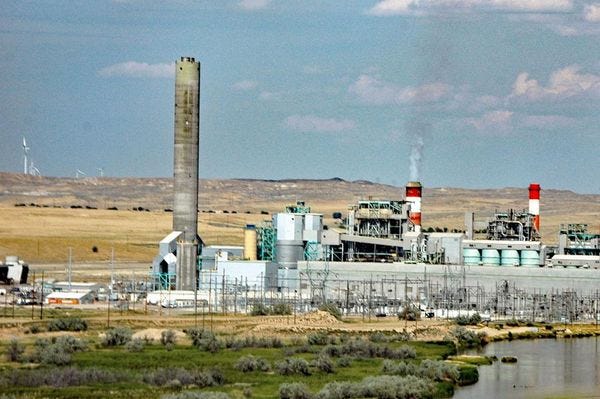Wyoming's Biggest Utility Murdering Coal Plants, Guess Wyoming Will Have To Sue 'Wyoming'
Quite the conundrum!
The state of Wyoming produces roughly 40 percent of America's coal, and the Republicans who run the state are dead set against losing a top industry, even as coal is being abandoned as an energy source. That's not merely because those damncommieliberals are doing war on coal because of the climate emergency, but also because coal just makes less and less economic sense compared to natural gas, and even to zero-carbon energy sources like wind and solar. The free market has spoken, and it says it's tired of coughing up particulate matter from its lungs.
Naturally enough, the Wyoming legislature this year has done what any conservatives who love the free market would: They've passed laws aimed at preventing the market for coal from vanishing. In May, Republican Gov. Mark Gordon signed a law creating a $1.2 million fund to be used to sue other states if they stop buying Wyoming coal, although whether it's actually constitutional is fairly doubtful, let alone whether it would really save the dwindling demand for coal.
In 2020, the state also poured a million dollars into a fund aimed at trying to keep other states from shutting down coal-fired power plants, and another law requiring that before any Wyoming coal-fired generating station can be shut down, its owners must first try to sell it to a non-utility company that would try to keep it going. That law went into effect July 1 of this year.
So how's Wyoming's effort to preserve a dying industry going? About this well: The parent company of the biggest utility company in the state is going forward with plans to get out of the fossil fuels business and switch to renewable energy. PacifiCorp, which owns Rocky Mountain Power in Wyoming and other utility companies around the Northwest, announced Friday that it's getting out of the coal business. It's going ahead with a plan to increase its share of renewables — plus one planned 500-megawatt "advanced nuclear reactor" — with "no new investment in coal or natural gas."
KPVI-TV in Pocatello, Idaho, has the deets:
PacifiCorp intends to retire 14 of its 22 active coal units by 2030 and another five by 2040, with the remaining three shuttered shortly afterward. It would retain two coal units at Wyoming's Jim Bridger power plant, converting them to natural gas peaking units in 2024.
All of PacifiCorp's Wyoming coal plants would be offline by 2039, according to this year's plan.
That's very good news for the goal of getting rid of fossil fuels; PacifiCorp estimates that, compared to 2005 emissions, its total CO2 emissions would be reduced 53 percent by 2025, 74 percent by 2030, and 92 percent by 2040. Those are the kinds of CO2 reductions that will be necessary to meet the national goal of net zero greenhouse emissions by 2050.
KPVI notes that PacifiCorp's schedule for retiring coal plants is pretty much the same as it had planned in 2019, "after a 2018 company report found that 13 of its 22 coal units were uneconomical ." As other utilities have determined, coal isn't making money, and clean energy is just plain cheaper.
In his state of the state speech back in March, Gov. Mark Gordon pledged his unwavering support for coal, glorious coal, and pretended the state could still keep relying on the expiring industry by pursuing carbon capture technology that would remove all the CO2 from coal burning plants and store it. That sounds very pretty, but the technology doesn't exist for the industrial scale that would be needed, and the R&D money would be better spent on developing renewables anyway. Nonetheless, the AP reported in May when the sue-other-states-to-take Wyoming-coal bill passed,
Wyoming has been funding research into the technology, however, including $10 million in a just-approved bill that slashed Wyoming's budget by over 10% amid weak revenue from oil, gas and coal extraction.
Rob Godby, a University of Wyoming economics prof, told KPVI that Gordon just might not have the most solid grasp on economic reality (OK, that's just us editorializing, fine ):
"Wyoming policy has actively tried to resist the transition away from coal and to prolong plant lives and mine lives," Godby said. "And so far, just looking at the outcomes, that's been largely unsuccessful."
Well, sure, it looks that way now, but just wait until all those lawsuits force everyone to buy Wyoming coal again — including Wyoming! And after that, the state's buggy whip manufacturing base should come roaring back, just as soon as horses can be fitted with catalytic converters.
[ AP / Electrek / KPVI-TV / Photo (cropped) by James St. John, Creative Commons License 2.0 ]
Yr Wonkette is funded entirely by reader donations. If you can, please give $5 or $10 to help us keep our little mommyblog going, and to expand to a print edition delivered by carrier pigeons.
Do your Amazon shopping through this link, because reasons .




She said in high dungeon, her toilet brush held aloft as the sun set behind the green, rolling hills.
There shalt always be a Harrisburg!
Addendum:
Look. You’re supply-side oriented, I’m demand-side oriented. We obviously both know something about the industry. We just disagree.
How about we call a truce and leave it there? We’re wasting a lot of time and energy, ahem, that could be better focused on making fun of Republicans.